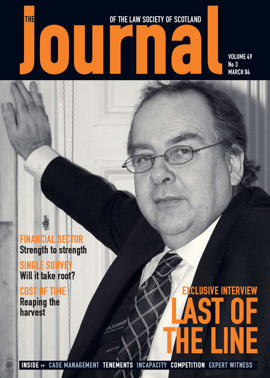For the United Kingdom?
The UK Government’s proposals to transfer the appellate jurisdiction of the House of Lords and Judicial Committee of the Privy Council to a newly-constituted Supreme Court have provoked considerable debate.
The Lord President, speaking on behalf of Scottish Judges, has expressed concern that such a body could be damaging to the separate identity of Scots law. Could one implication of the operation of such a court be that all its decisions would be binding throughout the UK, whereas at present decisions of the House of Lords are binding only in the jurisdiction from which the appeal in question derives? Lord Hope of Craighead has expressed concerns. The Faculty of Advocates, MPs and some MSPs have also criticised the proposal.
In response, the Lord Advocate, Colin Boyd QC, delivered a careful and detailed speech to a Law Society conference on 21 January. He commended them as an opportunity to remove an anomalous situation where part of the legislature functions as part of the judicial system.
The Treaty of Union has been cited by opponents of the scheme because of article 19, designed to prevent Scottish appeals being heard by English courts. One of the questions accordingly is whether, in legal theory, the administration of the “new” Supreme Court by the Department for Constitutional Affairs would breach that provision.
In such august company, practitioners may be cautious about venturing into a debate on legal theory. However, provided the existing jurisdictions are simply transferred to the new body, many will feel that there is little reason to believe that the change, per se, will give rise to difficulty. If it is thought necessary to enact specifically that decisions on appeals are binding only in the jurisdiction from which the appeal comes, that could be done (although there is something to be said for the Lord Advocate’s view that the reality at present that a decision of the House of Lords on the wording of a UK statute is treated, in practice, as binding throughout the UK, regardless of the jurisdiction from which the appeal originated).
As with so many changes, however, the real issues may turn out to be less theoretical than practical. Given that a very significant part of the work of the DCA is the running of the English court system, even those imbued with only modest levels of cynicism might readily conclude that the running of the Supreme Court by that same department could well lead to influence from English approaches and procedures, that influence being the more dangerous because it would operate largely unseen. It is difficult at first sight to believe, in the real world, that a separate approach in relation to the Supreme Court would be adopted.
As the Lord Advocate has pointed out, the DCA already has responsibility for a number of tribunals and the like which operate throughout the UK. That may not necessarily be the best example to pray in aid of the Government’s position. Anecdotal evidence suggests that, in its practical operation, that Department is, to put it no higher, not very inclined to pay special attention to the practices, procedures and traditions of the Scottish legal scene. Perhaps Journal readers have experience which they could share on the letters page?
The argument for extracting what is already in reality a “supreme” court from the legislative panoply of the House of Lords is easily understood. To transplant the uprooted institution into the structures of another much larger organisation does not immediately seem logical. Even if most observers are inclined to discount the fears of th ose who believe that a mainstream civil service department is more likely to exert malign influence on the judicial system than the existing administration of the Lords, those fears exist. And no doubt the portrayal of that same Department in the TV programme Judge John Deed merely pours fuel on the embers!
Perhaps I will not be alone in feeling that, if there is to be change, the argument for extracting the Supreme Court and its supporting administration completely from all other Departments and influences is a formidable one. A separately resourced court with its own independent arrangements (accompanied by such legal protections as might be thought appropriate) seems an obvious answer – one which would reduce, if not eliminate, concerns for the separate identity and development of the Scottish legal system.
In this issue
- Consumers and their guardians
- For the United Kingdom?
- Law meets its maker
- Falconer's safe landing
- Competition and the solicitor
- Flying the flag in finance
- Last piece of the jigsaw
- A good year for most firms
- System addicts
- Putting theory into practice
- The corporate challenge
- Make money out of IT
- A first-rate presentation
- The usual experts?
- Obituary: David Stewart Williamson
- Pearls of wisdom
- Work in progress
- The quality assurance scheme
- Fair hearing with prior knowledge?
- Scottish Solicitors' Discipline Tribunal
- Managing the timetable
- Are landlords' fears justified?
- Caps the stars don't want
- Website reviews
- Book reviews
- Best foot forward?
- The new law of real burdens






